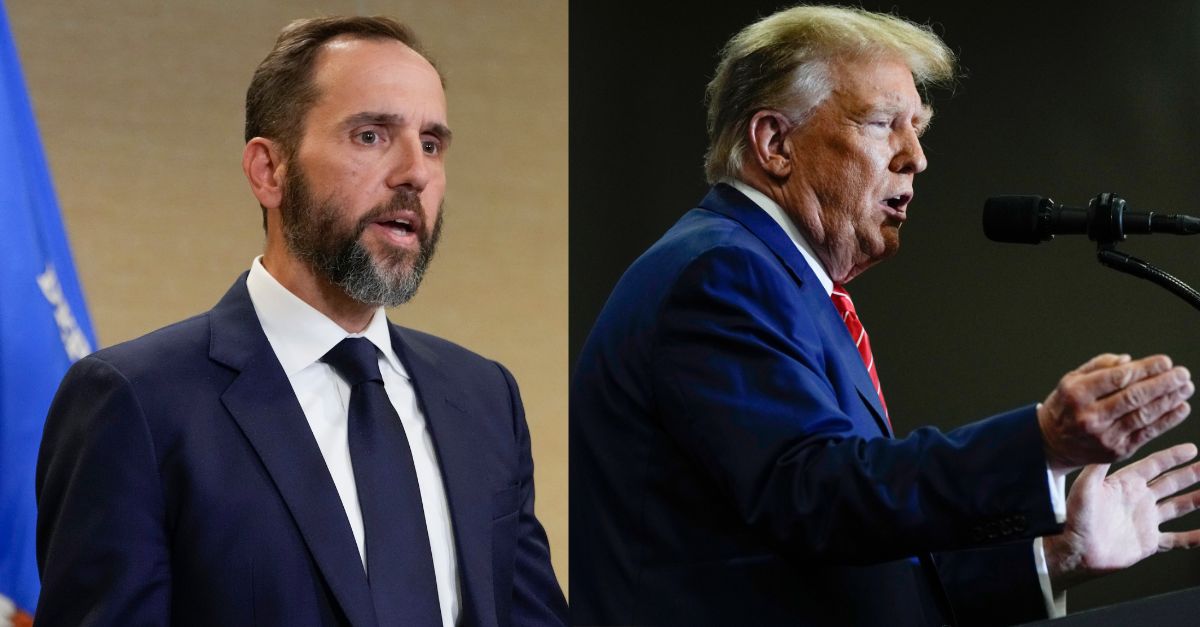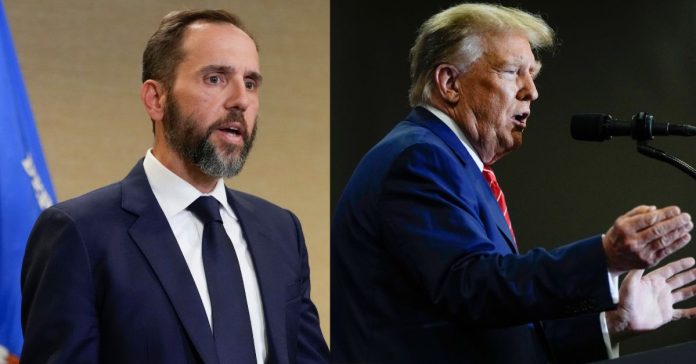
Left: Special counsel Jack Smith speaks about an indictment of former President Donald Trump, Aug. 1, 2023, at a Department of Justice office in Washington, D.C. AP Photo/Jacquelyn Martin, File./Right: Republican presidential candidate former President Donald Trump gestures after speaking during a commit to caucus rally, Saturday, Jan. 6, 2024, in Clinton, Iowa. (AP Photo/Charlie Neibergall)/Inset: Special Counsel Jack Smith
In a bid to throw out an indictment that he criminally conspired to overturn the 2020 election, a lawyer for Donald Trump on Tuesday asked an appeals court in Washington, D.C., to grant former presidents total immunity, placing the already-powerful office of the U.S. presidency beyond legal reproach — even if the president ordered SEAL Team 6 to assassinate his rivals.
The stark question was posed to Trump’s attorney John Sauer by Judge Florence Pan: Was a president immune from prosecution for any unlawful act, at all? Could a president order his political rivals to be assassinated by Seal Team 6 as an official act? Could he sell pardons at his pleasure if he saw fit and then face no consequences for his actions?
“He would have to be impeached and convicted first,” Sauer replied, setting off oral arguments that spanned more than an hour at the U.S. Court of Appeals for the District of Columbia Circuit. Also on the bench were Judges Michelle Childs and Karen LeCraft Henderson. Both Pan and Childs are appointees of President Joe Biden; Henderson is an appointee of George H.W. Bush.
The former president attended the hearing in person and NBC reported that he appeared frequently animated and agitated during proceedings. He did not take questions from reporters outside of the courthouse but announced he would deliver remarks later Tuesday through his spokesman. It is Trump’s right to attend though it is not obligatory. He has historically waived appearances when motion hearings or status conferences have been held in the lower court before U.S. District Judge Tanya Chutkan.
Arguing on behalf of the special counsel’s team was James Pearce.
When it was Pearce’s turn to address Sauer’s startling argument, Pearce called the proposition “frightening” and said the theory that only an impeachment and conviction could invite the opportunity for criminal prosecution was “textually, structurally and historically” anathema to the intent of the Constitution and what the nation’s founders set out in its separation of powers.
“Frankly, what kind of world are we living in, if I understood my friend on the other side to say here, a president orders his SEAL team to assassinate a political rival and resigns, for example, before impeachment? [That’s] not a criminal act? A president sells a pardon, resigns [and] is not impeached? [That’s] not a crime? I think that is an extraordinarily frightening future and that this is the kind we are talking about [when] balancing and weighing of the [public] interests.”
“I think that should weigh heavily in the court’s consideration,” Pearce said.
A decision by the appeals court is expected soon and no matter the outcome, the ruling is likely to be appealed to the U.S. Supreme Court.
Trump’s trial date of March 4 currently held on the docket in Washington, D.C., could be in jeopardy; the special counsel attempted to preserve it by bypassing the appeals process by going directly to the Supreme Court, but the request was summarily refused without comment.
Trump argues the four criminal charges against him in Washington, D.C., including conspiracy to defraud the United States, conspiracy to obstruct an official proceeding, obstruction of and attempt to obstruct an official proceeding, and conspiracy against rights, are “unconstitutional” on numerous grounds.
The ‘presidential immunity’ claim
First, Trump — who has pleaded not guilty to all of the charges — argues that anything that prosecutors allege occurred while he was commander-in-chief was part of his official duties to ensure “election integrity.”
That included his baselessly and lengthy expositions and solicitations about a “stolen” election in 2020 and 2021, and his conduct around and on Jan. 6 when an armed and largely violent mob seized the U.S. Capitol.
In court filings, Trump has described his conduct when reflecting on his indictment as activities that would fall on the “outer perimeter” of his role as president if they were not fully protected by it anyway.
The ‘double jeopardy’ claim and the separation of powers
Trump also argues he is immune from indictment since the U.S. House of Representatives impeached him on a single charge of incitement of insurrection and the Senate acquitted him on that same charge. As his election interference case mounted in the lower court last year, Trump tried and failed to invoke this recent history as proof of violation of the rules against “double jeopardy.”
Smith argued to the appeals court in December that Trump’s take was “wrong.”
His impeachment and acquittal were not similar in their claims or their venue. In the simplest terms, what happened to Trump in Congress was not a criminal proceeding, Smith argued. The worst that could happen there was his removal or disqualification. Neither pose criminal consequences, he told the court. When Chutkan denied Trump’s bid to dismiss the case on total immunity grounds in early December, she was clear that first and foremost, former presidents are not given a “get-out-of-jail-free” pass for the remainder of their lives.
Trump himself has made this argument before: in the 2020 case Trump v. Vance in New York, Trump argued he was immune from prosecution while he was president, saying that the benefit “would expire when the ‘President leaves office’ and therefore would not place the President ‘above the law.””
Smith and his team of prosecutors have underlined this as well regarding civil matters and civil liability. Richard Nixon, for example, accepted a pardon from President Gerald Ford in 1974 after he resigned in the wake of Watergate. Special counsel prosecutors argue today that this pardon is essentially proof of what the prevailing consensus was at the time — Nixon, a former president, feared potential criminal prosecution. And Ford extended it to him to avoid the morass altogether.
‘Friends of the court’: Jurisdiction and merit
The parties also heard brief arguments Tuesday over questions raised by outside groups like American Oversight. The liberal advocacy group filed an amicus brief last week asserting the case shouldn’t be heard at the appeals court at all because the question was improper on its face: criminal defendants cannot appeal a crime before a conviction is rendered by a judge or jury, they said.
In favor of Trump’s side, Edwin Meese, a former U.S. Attorney General, argued in his own brief to the court that Smith’s appointment as special counsel was improper.
This story is developing.
Have a tip we should know? [email protected]

